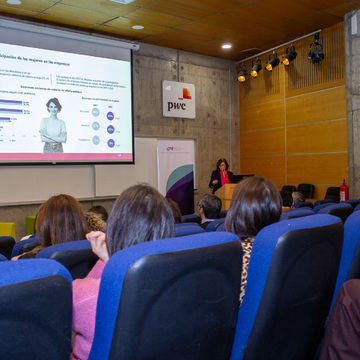- The Report addresses women's and men's access to the financial system, contributing to the design and implementation of public policies on gender equity.
- This year's Report includes new data on the use of insurance products.
- Following the presentation of the Report at the School of Economics and Business of the University of Chile, a panel discussion was held with the participation of CMF Chairwoman Solange Berstein, School Dean José De Gregorio, and Company Director Karen Ergas.
- Mrs. Berstein will present the Gender Report tomorrow in the Biobío Region during an activity organized jointly with the Faculty of Economics and Administrative Sciences of the University of Concepción.
August 29, 2023 - Solange Berstein, Chairwoman of the Financial Market Commission (CMF) presented today the 2023 Report on Gender in the Financial System at an event hosted by the School of Economics and Business of the University of Chile. For over two decades, the Commission's Gender Report has addressed access to and use of financial products and payment behavior by gender and has also incorporated information in recent years about the participation of women in managerial positions in the financial system.
The 2023 edition of the Gender Report incorporates groundbreaking data on men's and women's use of insurance based on a group of insurance companies representing 61 percent of the sector's premiums.
"The Gender Report contributes to making gender gaps in the financial system visible; to raise awareness of the importance of making progress in closing economic gender gaps; and to generate statistical information for the design, implementation and evaluation of public policies and private initiatives in the area of gender equity," stated Chairwoman Berstein during her presentation.
Although there have been improvements in recent decades in women's access to financial products and the closing of gaps associated with population coverage, Mrs. Berstein stressed that, "There are still important challenges related to the intensity of use and the combination of different financial products, and to the participation of women in management positions within the industry".
Women in Boards of Directors
According to the Report, participation of women on boards of directors and in management positions of securities issuers is low at 15.1 and 27.5 percent, respectively. Despite increases in participation over the past year, and even though the number of securities issuers without female participation decreased at all hierarchical levels between 2021 and 2022, it is still a low percentage compared to international levels.
The largest gender gaps for women's participation on boards of directors occur in banking institutions (banks, subsidiaries, and support companies of banking activities), while saving and credit cooperatives have the smallest.
Gender gaps on women's participation on boards of directors of private companies
|
Sector |
Participation in 2022 |
Variation Between 2021 and 2022 |
Gap Tendency |
|
Banking Subsidiaries and Support Companies |
8.4 |
-0.6 |
Increases |
|
Banks |
11.2 |
+3.2 |
Decreases |
|
Publicly Traded Companies |
14 |
+1.4 |
Decreases |
|
Public Securities Issuers |
15.1 |
-1.7 |
Increases |
|
Non-Banking Payment Card Issuers |
15.8 |
+5.8 |
Decreases |
|
Insurance Companies |
17.5 |
-4.5 |
Increases |
|
Companies Listed on the IPSA |
17.8 |
+2.4 |
Decreases |
|
Savings and Credit Cooperatives |
28.0 |
+1.6 |
Decreases |
Participation and variation show the proportion of women on boards of directors and are measured in percentages. Only cooperatives supervised by the CMF are included, and their figures correspond to the managerial boards of said entities. Source: CMF.
Access to Cash, Loans, and Savings
Cash management, savings and credit products have a significant population coverage, with no significant differences in access for men and women. However, gaps exist in the related amounts. The coverage of cash management instruments has increased in the last two decades. Demand accounts are the product with the highest coverage per inhabitant, and in which the coverage of women exceeds that of men. However, the gap between men and women in average balance of these accounts has remained stable: for every CLP 100 in men's accounts, women have CLP 66.
Regarding savings products, term savings accounts have the highest coverage per capita. Women have higher coverage than men in housing and term savings. Term deposits constitute the largest proportion of money, while both housing savings and voluntary pension savings are lower.
Gaps in the coverage of banking loans have decreased over the past five years, mainly due to consumer loans. Nevertheless, there are still significant differences in average amounts and balances. While the gap in overall loans granted went down from 64 to 37 percent, the gap in average balances increased from 36 to 42 percent.
Holding and Using Insurance
This year's Gender Report includes brand new data on usage of insurance by men and women, which includes several companies representing 61 percent of the sector's premiums. The results show that women have a lower share than men in the total number of policyholders for both life and general insurance. Based on information from a set of insurance companies, the distribution of insurance between men and women (both for life and general insurance) is around 45 percent for women and 55 percent for men.
Indebtedness and Arrears
The 2023 Gender Report shows women have lower financial burden and leverage than men with 4 and 30 percent less, respectively. Likewise, female payment behavior is consistently better than those of males. For the banking sector, the arrears of 90 days or more is 0.72 percent higher in the case of men.
After her presentation, Chairwoman Berstein participated in a panel discussion with José de Gregorio, Dean of the School of Economics and Business, and company director Karen Ergas.
Tomorrow, Mrs. Berstein will present the Gender Report in the Biobío Region during an activity organized jointly with the Faculty of Economics and Administrative Sciences of the University of Concepción.










